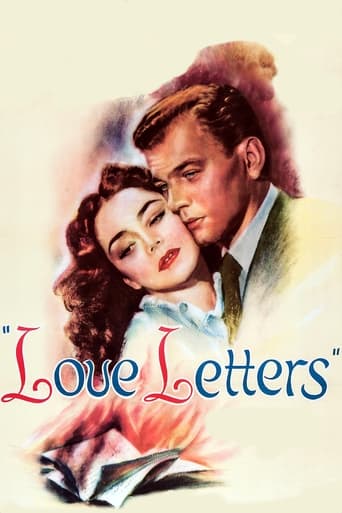Alex da Silva
Soldier Joseph Cotten (Quinton) writes love letters to Jennifer Jones (Victoria) on behalf of his army buddy Robert Sully (Roger). Jones falls in love with Sully as a result of these letters and this deception leads to them marrying one another. Things don't go well for either of them after this. After all, their love is based on a deception. Joe Cotten arrives on the scene to sort things out. And things need sorting out as Jones has amnesia after a disturbing incident.This film is a romance that keeps you watching thanks to the cast but I wanted it to be better. Housekeeper Cecil Kellaway (Mac), rather annoyingly puts on a terrible accent from nowhere. It's an inconsistent mix of Scottish and Northern English and is probably his attempt at Irish. He is the weak link in the cast as everyone else gives a good account of their roles and even though Jones has an unbelievable role in the first place, she does alright with it. At work, a Quentin refers to a homosexual so I was giggling to myself every time Cotton's character was name-checked. Turns out his name was Quinton, so elocution fell short at times in this film. The name "Singleton" also gets annoying. Why is it repeated so much? In terms of the story, it could have been better if Jones had played things as an evil character. As it was, the story succeeds as an unbelievable romance but is nowhere near their other effort "Portrait of Jennie" (1948). I was able to guess the 'surprising' twist pretty much immediately. What is surprising is that this film got passed the Hayes Code. We get a man who gets murdered for doing absolutely nothing and the perpetrator literally gets away with murder. How did they miss that plot line?
howardmorley
After my last user comment dated 27/6/02 (using a different email address), I am again putting electronic pen to this web-site with the happy news that "Love Letters"(1945) is now showing in its entirety on www.youtube.com and in its original language (not just the Italian dubbed version).I have this thing about Jennifer Jones and being a talented artist, I have made several portraits of her which are hanging in my house.Of course my love goddess has since died aged 90 in 2009 but like in "Portrait of Jennie" (1948) her screen spirit image lives within me still.By the way my wife knows of my attachment to this actress and indeed to other 1940s raven haired actresses whose dvds I collect like Vivien Leigh, Hedy Lamarr, Margaret Lockwood, Gene Tierney, and Ava Gardner! Of course when I showed my work at art class showing JJ, only the older students recognised her. My original user comments stand but this time I found myself freezing certain scenes showing JJ so I could drink in her astounding beauty.I awarded this film 8/10 as next to "Portrait of Jennie" it is my favourite JJ film.
utgard14
Allen Quinton (Joseph Cotten) is a soldier in World War II who has been writing love letters for fellow soldier Robert Morland to his girl back home. Morland's kind of a jerk but the letters written is his name make him appear to be a kind, romantic soul and the girl they are written to falls in love with him. When Allen returns home from the war he discovers Morland married the girl but it ended in tragedy. Allen is intent upon finding out what happened. This leads him to a number of twists and a meeting with an amnesiac girl named Singleton (Jennifer Jones).Joseph Cotten's performance is great. Cotten, one of the great actors of his day, is sadly underrated today. Ann Richards gives a natural, sympathetic turn as Singleton's friend Dilly. Jennifer Jones is not up to Cotten's level. Her performance is OK but a little too manufactured. Still, she's competent here but outshined by Cotten, as well as supporting player Richards and vets Cecil Kellaway and Gladys Cooper.William Dieterle creates a lovely, atmospheric picture. I love the sets, the houses, the matte painting backgrounds. Victor Young's music is evocative and romantic. The script is by Ayn Rand (!) from a novel by Christopher Massie. My one real gripe is that I hated the name Singleton for this girl and every time they said it, it was like nails on a chalkboard for me. Hearing Joseph Cotten say "I love you Singleton" sounds like some secret joke forgotten decades ago. Whether it was Rand's idea or Massie's, I don't know. But it was stupid and provides clunky hiccups in the dialogue. Despite a few quibbles, it's hard to dislike. Interesting, romantic, effective mystery film that should entertain all but the stone-hearted among us.
andrewsarchus
Although it doesn't really come close to 1949's "Portrait of Jennie" this is a nice little psychological thriller from the same director and the same Cotten/Jones team. It lacks Portrait's timeless theme of "love transcendent" but there is a good taut script by Ayn Rand (one of her few Hollywood efforts) and a wonderful score (later song) by Victor Young. Cotten is good and Jones may be more goody-goody than usual (despite portraying a supposed 'free spirit') but it is Dieterle's direction that makes the whole thing watchable, bringing the same sort of haunting atmosphere to this film as he brings to "Portrait", the final denouement being realized with great cinematic economy and style.

